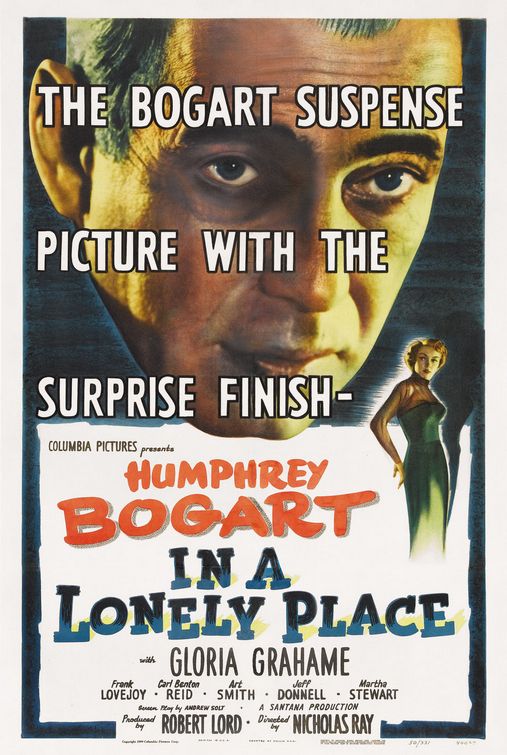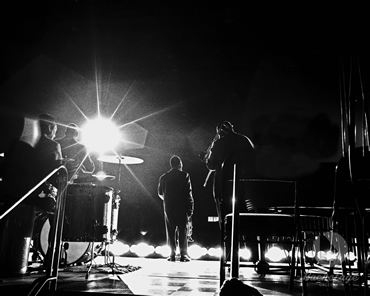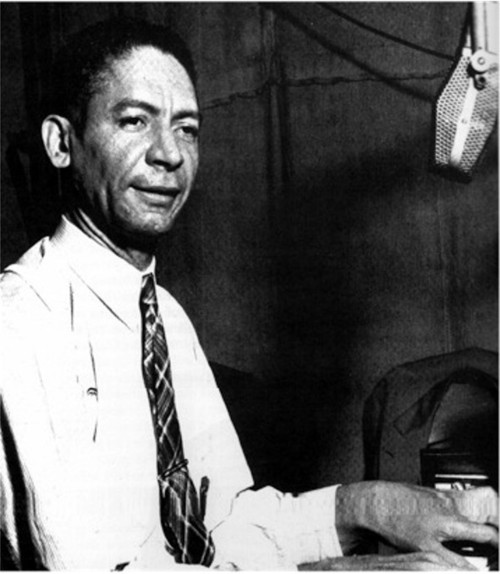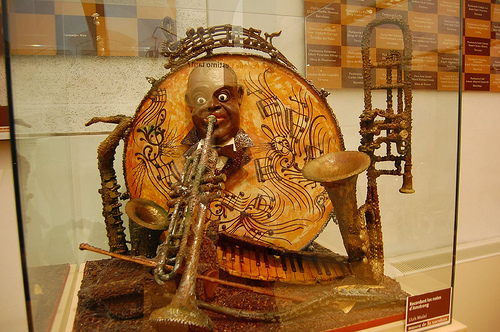“Money is like a sixth sense without which you cannot make a complete use of the other five.”
W. Somerset Maugham, Of Human Bondage
Archives for August 2009
TT: On the big screen
 New York-based cinephiles, take note: In a Lonely Place, starring Humphrey Bogart and Gloria Grahame, opens Friday at the Film Forum for a nine-day run. Nicholas Ray’s 1950 study of an angry screenwriter suspected of murder is widely ranked next to Jacques Tourneur’s Out of the Past as the quintessential film noir, a judgment in which I wholeheartedly concur.
New York-based cinephiles, take note: In a Lonely Place, starring Humphrey Bogart and Gloria Grahame, opens Friday at the Film Forum for a nine-day run. Nicholas Ray’s 1950 study of an angry screenwriter suspected of murder is widely ranked next to Jacques Tourneur’s Out of the Past as the quintessential film noir, a judgment in which I wholeheartedly concur.
David Thomson, among countless other critics, is a great admirer of In a Lonely Place:
Like any American director, [Ray] had to accept some routine assignments, but in the next few years he added these marvels to his list: In a Lonely Place (with Humphrey Bogart playing an embittered and potentially violent Hollywood screenwriter); On Dangerous Ground (which has Robert Ryan as a brutal cop); and The Lusty Men (where Robert Mitchum is a rodeo veteran who agrees to train the young Arthur Kennedy, but falls in love with his wife Susan Hayward).
None of those films did especially well. They were all black and white. But they are filled with anguish and ecstasy and a kind of framing and lighting and camera movement that steadily deepens the routine script material. In a Lonely Place is less showy than Sunset Boulevard, but it is the truer portrait of Hollywood compromise and hypocrisy….
Certainly it’s the greatest performance that Bogart ever gave in front of a camera, and if you’ve never seen it in a theater, I strongly recommend that you make every effort to do so now. Book your tickets now–I’ll be very surprised if this one doesn’t sell out.
For more information, go here.
* * *
The theatrical trailer for In a Lonely Place. The singer performing “I Hadn’t Anyone Till You” is Hadda Brooks:
TT: Almanac
“Now the world in general doesn’t know what to make of originality; it is startled out of its comfortable habits of thought, and its first reaction is one of anger.”
W. Somerset Maugham, Great Novelists and Their Novels
TT: Behind the scenes
Bill Evans, the most influential jazz pianist of the postwar era, would have turned eighty on Sunday. In honor of that anniversary, Marc Myers has just posted the first installment of a five-part interview with Laurie Verchomin, who was Evans’ lover during the last year and a half of his life. You can read it by going to JazzWax, Marc’s blog. It promises to be essential reading.
* * *
The Bill Evans Trio plays “Midnight Mood” live in 1979:
TT: In the details
 Pops: A Life of Louis Armstrong, which comes out in December, is about to go to the printer. This means that I still have a few more days in which to make changes in the text–though not large or frivolous ones. The Unwritten Law of Last-Minute Fixes is that they should only be made to correct actual factual errors, so I’ve been rereading Pops with a gimlet eye to see if anything slipped past me.
Pops: A Life of Louis Armstrong, which comes out in December, is about to go to the printer. This means that I still have a few more days in which to make changes in the text–though not large or frivolous ones. The Unwritten Law of Last-Minute Fixes is that they should only be made to correct actual factual errors, so I’ve been rereading Pops with a gimlet eye to see if anything slipped past me.
On Friday I made three one-word fixes:
• In the prologue, I made a change in this sentence:
Armstrong was deserted by his father before he was born, raised by a part-time prostitute, and sentenced at the age of eleven to the Colored Waif’s Home, an orphanage-like reform school, for firing a pistol on New Year’s Eve.
I changed before to when.
Elsewhere in the book, I quote Armstrong as saying that his father “left us the day we were born.” I don’t know how this inconsistency escaped the attention of the half-dozen people who’ve read the manuscript of Pops, but I finally spotted it last week and fixed it at once.
• In the second chapter, I made a change in this sentence:
Born in 1885, Oliver [Joe “King” Oliver, Armstrong’s mentor] was a dark-skinned butler turned musician who got his start playing in brass bands.
I changed butler to yardman.
The various Oliver-related sources that I consulted disagreed on this point, but late last week I tracked down a definitive primary source, a 1959 oral-history interview with Oliver’s wife that was cited in an end note to Bruce Boyd Raeburn’s New Orleans Style and the Writing of American Jazz History, published earlier this year. According to Stella Oliver, her husband worked as a “yard boy,” not as a butler. I shouted with joy when I ran across that note while re-reading Raeburn’s book.
• In the ninth chapter, I made a change in this sentence:
After the publication of Jazzmen, which Armstrong called “absolutely perfect” in a letter to one of the book’s contributors, the revival of interest in New Orleans jazz took wing.
I changed after to with because of the next sentence in Pops: “It came too late to help Oliver, but [Jelly Roll] Morton, who had been unceremoniously dropped from Victor’s roster of artists in 1930, was now invited back to record ‘High Society,’ ‘I Thought I Heard Buddy Bolden Say,’ and ‘Oh, Didn’t He Ramble’ with an all-star band whose members included Sidney Bechet and Zutty Singleton.”
 Once again, it was New Orleans Style and the Writing of American Jazz History that set me straight. Raeburn quoted a remark made by Frederic Ramsey, one of the co-authors of Jazzmen, at a 1982 symposium about Jelly Roll Morton:
Once again, it was New Orleans Style and the Writing of American Jazz History that set me straight. Raeburn quoted a remark made by Frederic Ramsey, one of the co-authors of Jazzmen, at a 1982 symposium about Jelly Roll Morton:
We had a book that was about to come out in October, that was the one called Jazzmen, and so we whipped up this deal by going to RCA Victor, and on the strength of a book coming out we could have Jelly Roll Morton’s New Orleans Jazzmen make a sessions [sic] or two.
The first of the two recording sessions took place on September 14, 1939, shortly before Jazzmen was published. Until I re-read Raeburn’s book, I hadn’t realized that Morton’s Victor sessions were arranged prior to the publication of Jazzmen, so I changed after to with in the interests of chronological clarity and exactitude.
Small stuff? Sure–but the Armstrong literature, including every previous biography, is so full of errors, some small and others dismayingly large, that I felt obliged to try and get everything right. Needless to say, I’m sure that I’ve made some blunders of my own, but I managed to correct so many other long-standing mistakes in the course of researching, writing, and editing Pops that I feel confident in saying that it will be the most factually accurate account of Louis Armstrong’s life ever to have seen print.
In saying this, I know I’m leading with my chin. Jazz scholars will soon be circling Pops like buzzards, looking for fresh carrion. Just the other day I got an e-mail from an Armstrong researcher in Germany who had somehow obtained a set of uncorrected page proofs of Pops. He told me that the book was “fantastic” but added that I’d gotten the title of one of Armstrong’s best-known albums wrong. I promptly fired off an e-mail to Larry Cooper, Houghton Mifflin Harcourt’s copy chief in Boston, asking him to make the fix on the double. Larry wrote back the next day to reassure me that I’d already caught the error myself and fixed it in galleys a couple of months ago. Rarely have I felt such relief!
Forgive my obsessiveness, but now that The Letter is out of the way and Pops has received its first pre-publication review, I’ve traded one set of jitters for another. When you’re writing about a great man, you can’t help but feel as though he’s looking over your shoulder. Insofar as I can, I want to do justice to Louis Armstrong–and that means, among countless other things, getting the small stuff right.
TT: Good enough to eat
A friend sent me this snapshot of an exhibit in Barcelona’s Chocolate Museum. I think Satchmo might have appreciated it!

TT: Almanac
“Everybody needs his memories. They keep the wolf of insignificance from the door.”
Saul Bellow, Mr. Sammler’s Planet
TT: What’s up, Bard?
Direct from the Berkshires to The Wall Street Journal, today’s drama column is devoted to Shakespeare & Company’s Twelfth Night and Barrington Stage’s A Streetcar Named Desire, both of which are excellent. Here’s an excerpt.
* * *
Did William Shakespeare invent screwball comedy? Not exactly, but “Twelfth Night,” among the dizziest and most farce-like of his romantic comedies, bears a definite family resemblance to the damn-the-torpedoes craziness of such classic examples of the genre as “Bringing Up Baby” and “The Lady Eve.” Nor does Jonathan Croy’s staging for Shakespeare & Company seek to paper over the similarities. Instead, Mr. Croy and his cast revel in them, hurtling through “Twelfth Night” with knockabout abandon and flinging laughter in all directions. No matter how rough a day you may have had at the office, a visit to Lenox to see this production will send you home with an ear-to-ear smile on your face.
While this is the first time that Mr. Croy has directed a mainstage play for Shakespeare & Company, he starred in the company’s brilliant versions of Tom Stoppard’s “Rough Crossing” (2007) and Charles Morey’s “The Ladies Man” (2008), and his “Twelfth Night” crackles with the lunatic energy of those full-tilt farces. I don’t know when I’ve seen anything funnier than his staging of the swordfight between Viola (Merritt Janson) and the fatuous Sir Andrew Aguecheek (Ryan Winkles), a piece of slapstick so precisely calculated and perfectly realized that it comes close to stopping the show. Almost as ludicrous is the near-demented lust with which the exquisite Countess Olivia (Elizabeth Raetz) chases the hapless Viola (who is disguised as a boy) all over the stage, eventually nailing her with an eye-popping kiss that clearly causes its recipient to reconsider the strength of her commitment to heterosexuality.
At the same time, much of the strength of this production lies in the transparent simplicity of its presentation. The open Elizabethan-style stage of the Founders’ Theatre is decorated with nothing more than six pennants and a catwalk. The costumes are colorful and traditional. No tricky directorial concepts are sprayed over the text–Mr. Croy is content to let Shakespeare be Shakespeare–and the actors respond by giving of their best, with results that are not merely funny but also emotionally true….
Now that I’ve seen two productions of “A Streetcar Named Desire” directed by women, I’ve come to the belated conclusion that the play makes perfect dramatic sense–when a woman is at the helm. Julianne Boyd, who directed Barrington Stage Company’s new revival of Tennessee Williams’ best-known play, has taken the same straightforward approach that Bonnie J. Monte brought to the version that she mounted for the Shakespeare Theatre of New Jersey last season, with equally rewarding results. Blanche DuBois, not Stanley Kowalski, is the star of Ms. Boyd’s show, and Marin Mazzie, like Laila Robins before her, gives us a Blanche you can believe in, a middle-aged woman who knows that she’s still sexy but can’t accept the earthy consequences of her fleshly longings. Christopher Innvar is no less believable as Stanley, playing him not as Superman in a bowling shirt but as the kind of traveling-salesman type you could imagine meeting in a bar…
* * *
Read the whole thing here.
